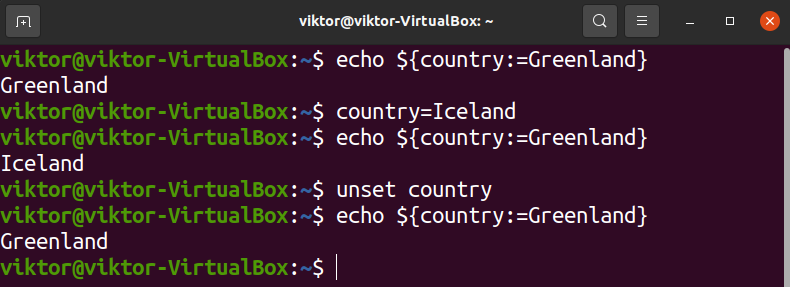When creating a Bash variable, it must have a value. However, we can use some tricks to set a default value if the variable is not set (or null). This guide will demonstrate how to do just that.
Default shell variable values
Method 1 – Setting variable value (if unset)
Let’s get started with the following demonstration. Run the following command:
The command will return nothing as the value of the country wasn’t set in the first place. If the value of the variable is unset, using the following technique, we can assign a value.
Here, Bash will check if the variable country has any value stored. As the variable wasn’t set before, it will assign the value “Greenland” to it.
Method 2 – Setting variable value (if unset)
The next method will be similar but involves a different syntax. Have a look at the following example:
Here,
- Does the variable country have a value?
- If yes, then print the value.
- If no, then use the default value “Greenland”.
Basically, we’re setting a default value that will be used when the variable is not set or have a null value.
Method 3 – Assigning default value to empty variable
This section will showcase how to assign the default value to a variable if the variable is empty. The command structure is as follows.
Let’s implement it in an example.
Here,
- Is the variable country empty?
- If yes, then assign the value “Greenland”.
- If no, then no new value is assigned.
We can also demonstrate it using the following commands. Run them one by one:
$ country=Iceland
$ echo ${country:=Greenland}
$ unset country
$ echo ${country:=Greenland}
Here,
- Command 1: As the variable country isn’t set, it will assign the default value “Greenland”.
- Command 2: The country value is updated to “Iceland”.
- Command 3: The variable country already contains the value “Iceland”, so “Greenland” not assigned.
- Command 4: Clears the content of the variable country.
- Command 5: Prints “Greenland” as country doesn’t have any value (unset from the last step).
Final thoughts
This brief guide showcased how to assign a default value if a Bash variable was not set or assigned no value. This technique can be useful in various situations, for example, handling errors when trying to access undefined variables.
Check out our Bash programming section for more tutorials on various Bash concepts with examples. If you’re new to Bash programming, check out this excellent Bash scripting tutorial for beginners.
Happy Computing!





